Reaction of Grand Mufti Husein Kavazović to the Controversial Statements of Prime Minister Viktor Orban
- Published in
- Category: LATEST NEWS

Hungarian Prime Minister Viktor Orban held a press conference yesterday, in which, among other things, as his office representative Zoltan Kovacs reports on social media, he stated that "the challenge with Bosnia and Herzegovina is how to integrate the country with two million Muslims." In reaction to this scandalous statement the Grand Mufti of the Islamic Community in Bosnia and Herzegovina, Husein Kavazović, said the following:
“If this statement of Prime Minister Orban proves to be true, then not only the Muslims of Bosnia and Herzegovina and the Islamic Community but everyone in Europe have reason to worry. Members of Bosniak people in Bosnia and Herzegovina are predominantly Muslims, just as Catholics are predominantly Croats and Orthodox are members of the Serbian people. Bosniaks are an old European people and together with the other two peoples of Bosnia and Herzegovina it determines and endures the fate of Bosnia and Herzegovina from the earliest times. Prime Minister Orban's statement suggests a monstrous untruth that Bosniaks are foreigners in Bosnia and Herzegovina and that the problem is that they are predominantly Muslim.
If xenophobic and racist ideologies become the basis for the policies of the united Europe or its members, then it takes us back to some not very distant times of our past when European unity tried to build on similar fascist, Nazi, violent and genocidal ideologies that led to the Holocaust and other horrific crimes.
We justifiably expect Prime Minister Orban to explain what he meant by such a statement, which caused unrest not only among members of the Islamic Community in Bosnia and Herzegovina, but also throughout Europe and the world.
Deniers of genocide in Bosnia and Herzegovina and the surrounding, same as those who support them, often claim that organized and systematic crimes against Bosniaks did occur, but that there was no genocidal intent. At the same time, from the same ideological milieu we often hear statements like the one of Prime Minister Orban about how the very existence of Bosniaks as a people on a part of the territory in Europe is problematic, and how they should be eliminated. This elimination can range from Genocide we witnessed in Srebrenica to deprivation of any political sovereignty and legitimacy of Bosniaks as people or the state in which they live. This is exactly what is now being attempted through support for separatist policies aimed at dismantling the state of Bosnia and Herzegovina and introducing apartheid into its political and social life.
In the end, Bosnians and Hungarians, like all other European nations, have a turbulent history. We remember the attacks of the Hungarian kings on the medieval Bosnian state, as well as the role of Bosniaks and other peoples of the Balkans in the Ottoman conquests of Hungary. We also remember the colonial policy of Austria-Hungary towards Bosnia and many good things we created together throughout that history, from common elements of our Central European culture to the graves of Bosniaks who are still throughout Hungary to witness the time when we were together in the same trenches.
It is a history that is behind us, with all its bitter and sweet periods, and it depends on us as responsible people to decide what kind of Europe we want to leave to our descendants. I
hope that this is not a Europe in which Bosniak people will again be exposed to genocide and
displacement as in the 1990’s, and only because they profess faith in One God and call themselves Muslims.
I was convinced after my goodhearted and sincere visit to Prime Minister Orban in 2016 and the conversations we had back then that the time of such chauvinistic statements is behind us, the greater my disappointment, but I hope that these statements and policies will not permanently damage our friendly relations with good people of Hungary.“
